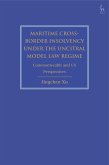Well-functioning contract law is a crucial prerequisite for economic development. However, even though international trade has increased enormously in recent decades, we still know little about the contract enforcement mechanisms that exist in today's globalised markets. The aim of this work is to shed light on the governance of complex cross-border contracts by developing a comprehensive theoretical framework for understanding the relevance of both formal and informal institutions. This framework is then applied to an empirical study of cross-border software development contracts. Combining a unique data set of 41 qualitative expert interviews with statistical data and surveys, the author demonstrates that state contract laws show fundamental signs of dysfunction across borders. Companies engaged in globalised exchange therefore rarely use this mechanism. Even the European Union's supranational enforcement order is, in practice, insignificant. Against all expectations, international commercial arbitration also turns out to be limited in its ability to provide a workable legal infrastructure for global commerce. With global trade lacking a reliable formal legal order, companies have reacted by creating their own informal governance structures. This book explains how complex exchange in global markets has emerged in the absence of a global legal order.









